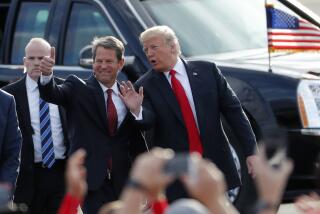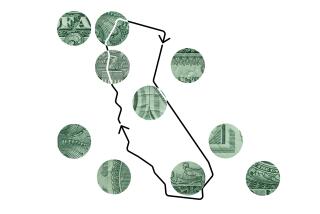Campaign ’96 / PROFILE : Kemp Turns Heads With Late Cheer for Forbes : Timing of endorsement surprises analysts. ‘He must have been on another planet yesterday,’ one says.
- Share via
WASHINGTON — In endorsing Steve Forbes’ candidacy at this late moment in the Republican presidential campaign, Jack Kemp is climbing aboard a ship that, if not sinking, is certainly becalmed.
Kemp’s move left many political analysts shaking their heads in wonder and bemusement.
With Senate Majority Leader Bob Dole apparently on an inexorable march to the GOP nomination, what does Kemp gain by endorsing a rival whose chance of wresting the prize from the front-runner appears to have vanished?
“He must have been on another planet yesterday,” said independent political analyst Stuart Rothenberg. “The timing is so strange; talk about closing the barn door after the horse has bolted.”
A longtime Kemp friend said the former Buffalo, N.Y., congressman and Bush Cabinet secretary concluded last week that Dole would win the nomination. But Kemp was unhappy with the Kansas senator’s inability to articulate a message of optimism and opportunity, this associate said.
In Kemp’s view, Forbes is the vehicle for a Republican message of lower taxes, faster economic growth and “compassionate conservatism” that Kemp has championed for more than two decades in public life.
“I think he has joined a winning cause, not a losing cause,” said California GOP political consultant Sal Russo, who has been a Kemp ally for years. “To be successful in 1996 and the future, the GOP has to be the party of economic growth and opportunity, a party of inclusion, the party of Ronald Reagan. Jack believes we need to put that message on center stage, whether the messenger is Forbes or Dole.”
Kemp himself acknowledged his decision angered some GOP leaders. Asked Wednesday night on CNN about reports that House Speaker Newt Gingrich had threatened political reprisals should he back Forbes, Kemp said: “[Gingrich] banged on me a little bit. I banged back. Our friendship will survive.”
Kemp’s late embrace of the publishing magnate is consistent with a number of curious choices he’s made in his political career.
Many in New York were mystified by his reluctance to seek statewide office in the early 1980s, when the former Buffalo Bills quarterback was riding a crest of popularity.
He sought the GOP presidential nomination in 1988 and initially seemed a prime contender to replace President Reagan. But his campaign speeches frequently dwelt on the party’s need to attract more minority members, a topic that stirred little interest in the primary campaign. He never became a factor in the race.
And in 1994, after remaining on the sidelines for months in the debate over California’s Proposition 187, which would deny an array of public benefits to illegal immigrants, Kemp finally weighed in against it. But his decision came long after his voice could have made any appreciable difference.
“Two weeks ago, [the endorsement of Forbes] might have had an impact, but he didn’t do it,” said William Kristol, editor and publisher of the conservative Weekly Standard magazine and a former top aide to Vice President Dan Quayle. “Now he’s doing it for symbolic reasons, but I’m not sure what’s being symbolized. It’s like declaring your support for Napoleon the day after Waterloo.”
Kristol said Kemp is at once quixotic and principled, which makes divining his motives difficult. “He doesn’t care that Forbes isn’t going to win, but I’m not sure how that enhances his agenda,” Kristol said.
Kemp has often seemed ready to become a leader of the post-Reagan GOP but has declined to enter the fray himself to try to advance his ideas.
A poll of delegates at the 1992 GOP convention rated him the overwhelming favorite to be the party’s standard-bearer in 1996. But after two years of flirting with a run, he declined, citing the rigors of travel and fund-raising.
He has never strayed from his core ideals: low-tax capitalism with a heart, concern for the poor, low tariffs, and a government big enough to care for the aged and underprivileged without bankrupting the rest of the citizenry.
For years, he has been alienated by the brand of exclusionary politics practiced by Patrick J. Buchanan.
“The party is coming dangerously close to being portrayed as [though] all we want is little government and big prisons,” Kemp said in a 1994 interview with The Times. “But people want a bigger menu, they want a bigger vision of America.”
It’s that vision that Kemp believes his friend Forbes brings to the 1996 contest.
Kemp said Wednesday that while he was joining forces with Forbes, he would not work to defeat Dole. Rather, he indicated, he wants to be sure that the “opportunity society” message he has espoused for years would be heard this year.
“Dole should be appreciative and grateful that Jack Kemp is trying to shift debate in that direction,” said Russo, who was treasurer of Kemp’s ill-fated 1988 presidential campaign. “Jack wants to try to pull Dole back to the Reagan side of the Republican Party.”
Times political writer Robert Shogan contributed to this story.
More to Read
Get the L.A. Times Politics newsletter
Deeply reported insights into legislation, politics and policy from Sacramento, Washington and beyond. In your inbox twice per week.
You may occasionally receive promotional content from the Los Angeles Times.








